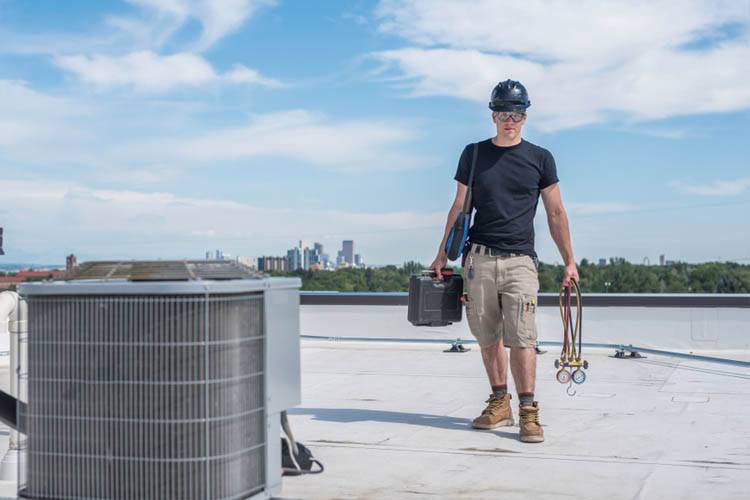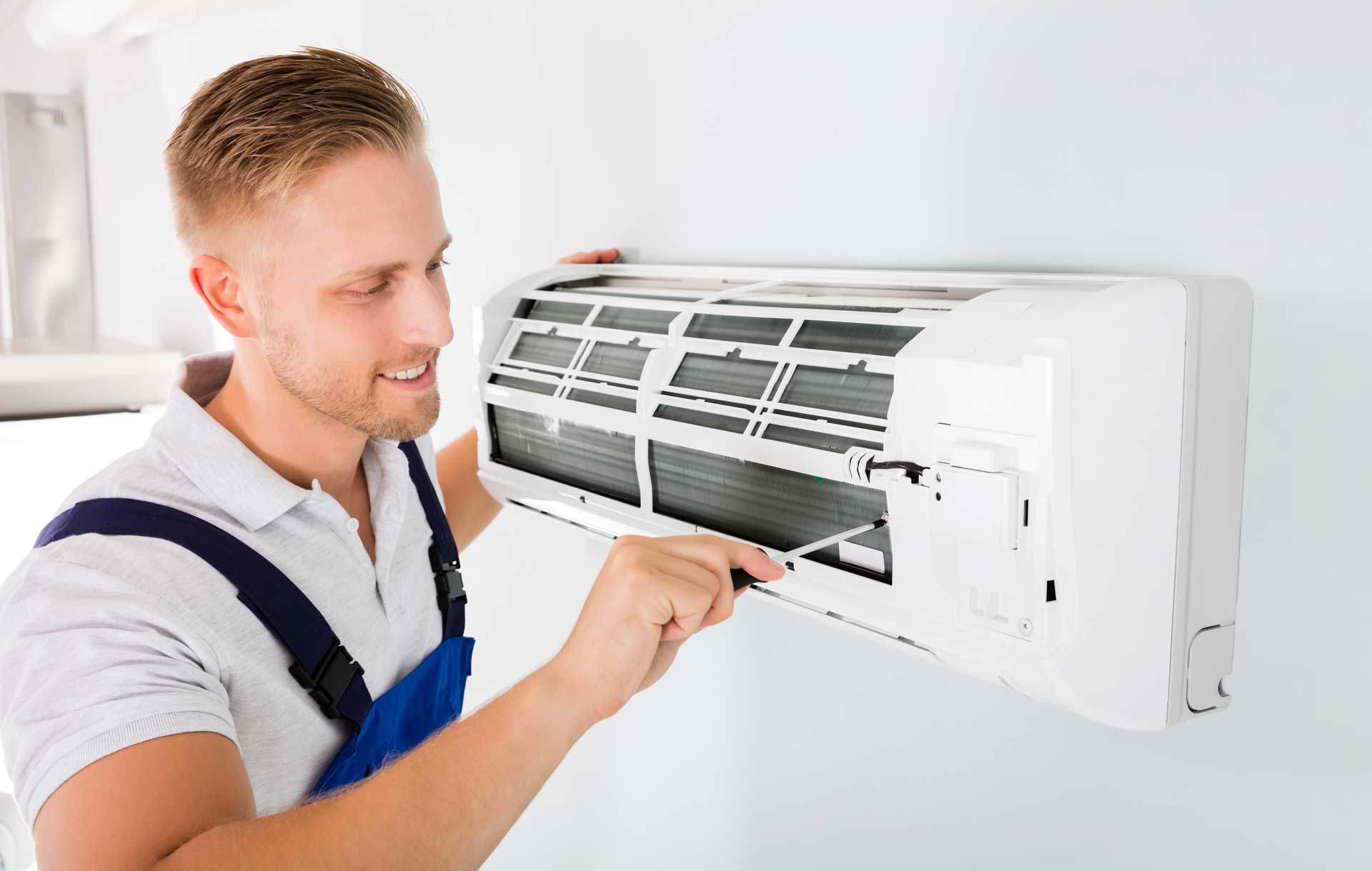Addressing Water Leaks from Your Air Conditioning Unit
The Science of Cool: Exactly How Air Conditioners Job =====================================================
Imagine your air conditioning unit as a master artist, adeptly sculpting away at the overbearing heat in your home, leaving behind a great, comfortable oasis. Have you ever asked yourself how this modern wonder accomplishes such a feat?
The intricate dance of cooling agents, coils, compressors, and air ducts all work in harmony to produce that invigorating blast of cool air. Yet how precisely do these elements collaborated to create that much-needed reprieve from the sweltering warmth?
Allow's reveal the internal workings of air conditioning unit and debunk the science behind remaining cool.
Key Takeaways
- Efficient ACs utilize cooling agents to absorb and release heat, improving cooling and energy effectiveness.
- Regular upkeep ensures optimum performance, durability, and power cost savings.
- Appropriate sizing and layout protect against power waste and make sure even cooling distribution.
- Understanding airflow characteristics and optimization enhances cooling performance and convenience degrees.
The Basics of A/c
Recognizing the fundamentals of air conditioning can considerably improve your knowledge of just how these systems operate successfully. Energy efficiency is a critical element of air conditioning, as it not just impacts your electrical energy costs but additionally the environment. Efficient air conditioners utilize less energy to cool down a space, making them cost-effective and environmentally friendly. By investing in an energy-efficient unit, you can enjoy a comfortable interior atmosphere while lowering your carbon impact.
Moisture control is another vital function of a/c. Air conditioners help control the moisture degrees in your home, creating a much more comfy environment. Excess moisture can bring about mold and mildew development and discomfort, while reduced humidity levels can trigger completely dry skin and breathing concerns. A well-maintained air conditioner can properly regulate humidity, ensuring a healthy and balanced and positive living setting for you and your household.
Recognizing just how a/c systems handle power effectiveness and moisture control can help you make notified choices when selecting and utilizing these systems in your house.
Comprehending Refrigerants and Their Role
When it pertains to air conditioning system, recognizing cooling agents and their role is very important. You'll find out about the relevance of refrigerants in cooling down systems and how they help with the warm transfer process.
Furthermore, considering the ecological effect of refrigerants is vital for lasting cooling options.
Duty of Refrigerants
Cooling agents play an important duty in the procedure of a/c unit by assisting in the transfer of warm. The effectiveness of a refrigerant straight impacts the cooling procedure and power intake of the system.
When taking into consideration refrigerants, it's important to evaluate their effectiveness against their ecological effects. Some refrigerants add to ozone depletion and international warming, prompting the look for greener choices. Lasting steps concentrate on finding refrigerant alternatives that are energy-efficient and have marginal ecological influence.
Makers are progressively investing in developing brand-new refrigerants that straighten with sustainability goals. By focusing on cooling agent performance and discovering sustainable choices, the cooling industry intends to lower its carbon footprint and decrease environmental injury.
Environmental Influence Factors To Consider
Taking into consideration the environmental effect of cooling agents is essential in assessing the sustainability of a/c systems. When evaluating the environmental ramifications of air conditioning system, 2 vital factors to think about are power efficiency requirements and carbon footprint evaluation.
- Power Performance Criteria:
Energy-efficient air conditioners consume less electrical power, minimizing general energy usage and environmental impact.
Carbon Footprint Evaluation:
Conducting a carbon footprint evaluation helps in comprehending the quantity of greenhouse gas discharges associated with cooling operations.
Refrigerant Choice:
Choosing cooling agents with reduced Worldwide Warming Potential (GWP) can significantly reduce the ecological impact.
Proper Disposal:
Making sure appropriate disposal of old cooling agents avoids them from harming the environment.
Normal Maintenance:
Normal maintenance of cooling systems can boost performance, decreasing power consumption and environmental effect.

The Process of Warmth Transfer
When your air conditioning system runs, it counts on a procedure of warm transfer to cool your area efficiently. https://brixtonhvac.co.uk/air-conditioning-repair.html This mechanism includes the absorption of heat from the interior air and the exchange of thermal energy to maintain a comfy temperature.
Recognizing this vital facet aids you grasp just how air conditioners properly control the environment in your house.
Warmth Absorption Mechanism

To properly cool the air in your room, ac unit utilize a warm absorption system that successfully moves heat. This system plays an essential role in preserving temperature policy and using advanced air conditioning technology.
Here's how the warm absorption process works:
- Refrigerant Circulation: The refrigerant absorbs warmth from the interior air.
 * Compression: The compressor increases the pressure of the refrigerant, creating its temperature to climb.
* Compression: The compressor increases the pressure of the refrigerant, creating its temperature to climb. - Condensation: The warm, pressurized refrigerant launches warmth outside as it condenses right into a liquid.
- Expansion Shutoff: This component lowers the cooling agent pressure, triggering it to cool down and vaporize.
- Evaporation: As the refrigerant evaporates, it soaks up heat from the interior air, starting the cycle over again.
Thermal Power Exchange
In the process of thermal energy exchange, heat transfer plays an essential duty in just how air conditioning unit operate to cool down indoor areas properly. Thermal characteristics determine that warmth constantly moves from a warmer location to a cooler one. A/c leverage this principle by removing warmth from interior air and releasing it outside, using refrigerants to promote the transfer.
Reliable thermal energy exchange is essential for the power effectiveness of an air conditioning system. By enhancing warmth transfer processes, air conditioners can cool down areas successfully while reducing power consumption. Recognizing the characteristics of heat transfer is vital for designing and running air conditioners that provide the preferred degree of convenience without unnecessary power wastage.
Evaporator Coils and Their Function
Comprehending the feature of evaporator coils is crucial to comprehending how ac system successfully cool indoor spaces. These coils play a crucial duty in the cooling procedure by taking in heat from the indoor air, which is then circulated back as great air.
Right here are some key points regarding evaporator coils:
- Evaporator coil efficiency directly impacts the cooling performance of the a/c unit.
- These coils contain cooling agent that evaporates as it soaks up warmth from the interior air. Cost-effective cooling solutions
- As the cooling agent evaporates, it alters from a liquid state to a gas, cooling down the air in the process.
- The cooled air is then distributed throughout the room by means of the duct.
- Correct maintenance of the evaporator coils, such as normal cleaning, is important to ensure leading performance and power performance.
Compressor and Condenser Workflow
Efficiently cooling down indoor areas includes understanding exactly how the compressor and condenser collaborate in a cooling system. The compressor plays a critical function in the cooling process by pressurizing the refrigerant gas, boosting its temperature and energy degree. This high-energy gas after that moves to the condenser, where it releases warm to the surrounding setting, triggering it to condense into a high-pressure fluid.
The condenser better cools this liquid via heat exchange with the outside air, transforming it back into a low-pressure gas. This process boosts energy performance and enhances the system's cooling power. Temperature level guideline is achieved as the cooling agent cycles via these system parts, absorbing warm inside and launching it outdoors.
Air Ducts and Air Circulation
To optimize air flow and warranty regular cooling throughout your area, proper setup and maintenance of air ducts are important. Guaranteeing that your duct are made effectively and in a way that advertises suitable air flow characteristics is crucial for the general performance of your a/c system. Ventilation techniques play a considerable role in maintaining interior convenience degrees, so it is very important to take note of the following:
Air duct Layout: Properly made air ducts assist make sure that amazing air gets to every edge of your area effectively.
Airflow Characteristics: Recognizing just how air relocations with the air ducts can assist you identify any possible problems that may interfere with the cooling procedure.
Normal Maintenance: Keeping your duct clean and without blockages is necessary for keeping airflow and system efficiency.
Securing Leaks: Ensuring that there are no leaks in your ductwork helps protect against great air from running away, enhancing energy performance.
Balancing Air flow: Appropriately stabilizing the airflow in different areas can assist preserve consistent air conditioning throughout your home or office.
Regularly Asked Inquiries
Just how Does the Dimension of an Air Conditioning System Affect Its Efficiency and Air Conditioning Capability?
When selecting an ac system, bear in mind that size issues. A device that's also small may struggle to cool your space effectively, while an extra-large one could throw away power and not evaporate properly. Guaranteeing proper sizing considerations will certainly enhance effectiveness and cooling capability.
The appropriate size straight influences performance, aiding you remain comfortable without unneeded prices. So, when it involves ac system, keep in mind dimension for ideal efficiency and cooling down power.
What Are Some Usual Maintenance Tasks That Can Assist Boost the Life-span of an Ac System?
Routine maintenance jobs can considerably prolong the life of your air conditioning unit. Keep in mind to replace filters to assure appropriate air movement and tidy coils to enhance cooling performance.
In addition, adjust your thermostat for precise temperature analyses and inspect the cooling agent degrees for best performance.
Can Air Conditioners Be Used in Conjunction With Other Cooling Techniques, Such as Fans or Dehumidifiers?
Yes, you can improve your cooling experience by integrating your ac unit with followers. This cooperation can assist distribute amazing air better, offering an extra comfy environment and potentially saving energy.
Furthermore, making use of a dehumidifier along with your air conditioning unit can boost cooling effectiveness by minimizing humidity degrees, making your room feel cooler.
Take into consideration these choices to enhance your cooling setup and enhance your total comfort throughout warm days.
Exist Any Ecological Concerns Related To making use of Air Conditioners, and How Can They Be Mitigated?
When making use of ac unit, bear in mind ecological issues like power usage and greenhouse gas discharges.
To alleviate these problems, consider lasting air conditioning methods and environmentally friendly options.
You can reduce the influence of a/c unit by using energy-efficient models, keeping them consistently, and incorporating other cooling methods like followers or dehumidifiers.
What Innovations Are Being Made in A/c Innovation to Make Units Much More Energy-Efficient and Environmentally Friendly?
To make a/c unit more energy-efficient and eco-friendly, innovations like wise innovation and eco-friendly attributes are being developed. These developments concentrate on increasing power savings and reducing environmental influence.
By integrating clever modern technology, a/c devices can maximize efficiency based upon use patterns. The use of environment-friendly products and elements likewise contributes to making these units much more sustainable.
These advancements aim to boost performance while lessening the ecological footprint of air conditioning technology.
Verdict
So, currently you know exactly how ac system function!
From the refrigerants flowing via the system to the warm transfer process, each part plays a crucial duty in keeping you cool down.
The evaporator coils soak up warm, the compressor and condenser launch it, and the duct distribute the cool air throughout your space.
Following time you activate your air conditioning, bear in mind the scientific research behind all of it! Stay trendy!